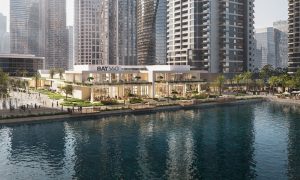Saudi Binladin woes point to uncertain KSA construction sector
News analysis: SBG was said in October to be laying off 15,000 staff

In October it was revealed that construction giant Saudi Binladin Group plans to lay off around 15,000 staff as the impact of low oil prices continues to be felt, according to a Reuters report citing industry sources. The possible layoffs at the firm, among the Middle East’s largest builders, would represent a small fraction of the group’s total workforce, which is said to be about 200,000. Saudi Binladin did not comment on the matter at the time.
“The Saudi construction sector is definitely soft. There’s general uncertainty and it’s very difficult to plan where to focus on, because companies are not sure which projects will go ahead,” said an industry source who declined to be named. Some of the 15,000 staff will be laid off immediately, while others will be temporarily transferred to work on a multibillion-dollar airport project in Jeddah, another source said.
In September, the Saudi Binladin Group was suspended from taking on new projects after a crane collapsed at Mecca’s Grand Mosque, killing 107 people. An initial government probe found that the crane was not properly secured and toppled as a result of bad weather conditions on the day. However, Saudi officials have said that sanctions against the contractor won’t hit current projects.
Speaking via an intermediary to Reuters, a senior Saudi official explained that the Kingdom will continue to make payments to the Saudi Binladin Group for ongoing work. He claimed that the review of the company’s current jobs after the Mecca crane disaster was to ensure that it meets safety standards.
An initial government investigation found that the crane had not been secured in accordance with its instruction manual. The contractor has traditionally been the Saudi government’s favoured contractor for very large or complex projects. It has worked for decades on projects in Mecca and Medina, as the government looks for ways to accommodate more pilgrims.
The biggest challenge facing the firm and other construction companies in the kingdom, however, is government spending cuts due to low oil prices.
According to the International Monetary Fund, Saudi Arabia is running an annual state budget deficit of over $100 billion, and the kingdom’s finance minister said in September that the government was delaying some projects to save money. While the finance minister did not elaborate on this, industry sources have confirmed to Reuters that a plan to build football stadiums across the country has been cut back and a $201 million contract to buy high-speed trains has been cancelled, while expansion on an oilfield has been slowed.
Bloomberg reported in October that Saudi Arabia was delaying payments to contractors after the oil slump pushed the GCC nation into a deficit. Government bodies have also demanded cost cuts from some contractors, Reuters reported. Additional information on austerity measures is likely to come next month, when the Saudi government is expected to announce its budget plan for 2016.
In addition, labour market reforms designed to push more Saudi citizens into private sector jobs have since 2011 made it difficult and more expensive for construction firms to hire foreign workers, increasing pressure on the industry. This was reflected in data showing that job postings in Saudi Arabia’s construction sector fell by almost a fifth in the year to October, amid a wider slowdown in Middle East recruitment growth, according to Monster.com.
The sense of pessimism in the Saudi Arabian construction industry was reinforced by comments made by the CEO of a major Saudi builder, Abdullah Abdul Mohsin Al-Khodari Sons, again in a Reuters report. “I think we should expect the difficult situation in the sector to go on for 18 more months,” said Fawwaz al-Khodari, chief executive of the builder. “Companies are facing troubles mainly due to the labour reforms. We will see the result of the budget deficit later, but now we are in a situation where the pain is already there. I believe many projects that are not seen as being essential will be first to be shelved, including those that were tendered but not awarded.”
Management reshuffle
In the summer of this year, Saudi Binladin president Bakr Bin Laden addressed a letter to senior members of the Bin Laden family, where he stated his intention to entrust his foremost duties to director Saleh Mohammed Bin Laden. He also identified a number of key figures to assist in the handover, and advised his successor to exercise caution in the selection of future SBG projects. “Dear brother [Saleh Mohammed Bin Laden]. You need to concentrate on preserving the rights of the group [SBG], both in terms of documentation and in calling for legal restitution, while preserving our good reputation in the process. You also need to be sure of the business feasibility of future projects, from every aspect, before you give your blessings on them and thus the group’s commitment to execute them,” Bakr Bin Laden said in the letter.

























